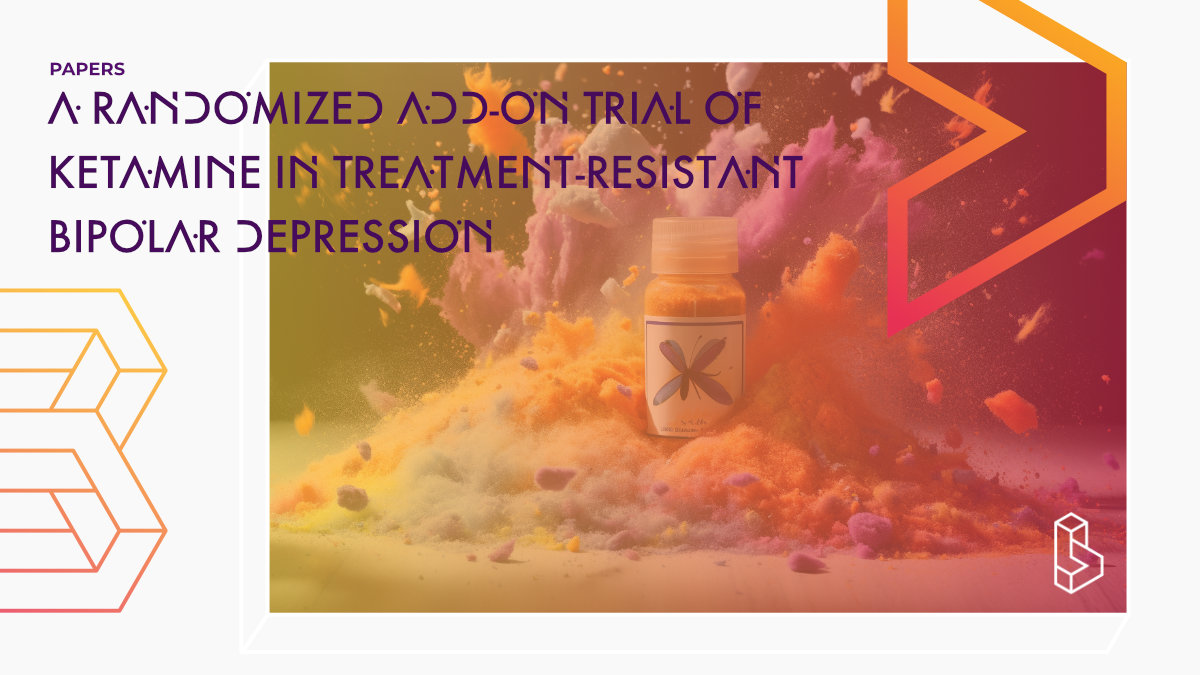This double-blind, placebo-controlled, randomized study (n=18) with those suffering from bipolar depression (BD; treatment-resistant) found that ketamine (35mg/70kg; 2x 2w apart) produced anti-depressant effects as measured on the MADRS scale. The effects were found immediately (40 minutes) and lasted up to three days.
Abstract of A Randomized Add-on Trial of Ketamine in Treatment-Resistant Bipolar Depression
“Context: Existing therapies for bipolar depression have a considerable lag of onset of action. Pharmacological strategies that produce rapid antidepressant effects—for instance, within a few hours or days—would have an enormous impact on patient care and public health.
Objective: To determine whether an N-methyl-D-aspartate–receptor antagonist produces rapid antidepressant effects in subjects with bipolar depression.
Design: A randomized, placebo-controlled, double-blind, crossover, add-on study conducted from October 2006 to June 2009. Setting: Mood Disorders Research Unit at the National Institute of Mental Health, Bethesda, Maryland.
Patients: Eighteen subjects with DSM-IV bipolar depression (treatment-resistant).
Interventions: Subjects maintained at therapeutic levels of lithium or valproate received an intravenous infusion of either ketamine hydrochloride (0.5 mg/kg) or placebo on 2 test days 2 weeks apart. The Montgomery-Asberg Depression Rating Scale was used to rate subjects at baseline and at 40, 80, 110, and 230 minutes and on days 1, 2, 3, 7, 10, and 14 postinfusion.
Main Outcome Measures: Change in Montgomery-Asberg Depression Rating Scale primary efficacy measure scores.
Results: Within 40 minutes, depressive symptoms significantly improved in subjects receiving ketamine compared with placebo (d = 0.52, 95% confidence interval [CI], 0.28-0.76); this improvement remained significant through day 3. The drug difference effect size was largest at day 2 (d = 0.80, 95% CI, 0.55-1.04). Seventy-one percent of subjects responded to ketamine and 6% responded to placebo at some point during the trial. One subject receiving ketamine and 1 receiving placebo developed manic symptoms. Ketamine was generally well tolerated; the most common adverse effect was dissociative symptoms, only at the 40-minute point.
Conclusion: In patients with treatment-resistant bipolar depression, robust and rapid antidepressant effects resulted from a single intravenous dose of an N-methyl-D-aspartate antagonist.”
Authors: Nancy Diazgranados, Lobna Ibrahim, Nancy E. Brutsche, Andrew Newberg, Phillip Kronstein, Sami Khalife, William A. Kammerer, Zenaide Quezado, David A. Luckenbaugh, Giacomo Salvadore, Rodrigo Machado-Vieira, Husseini K. Manji & Carlos A. Zarate Jr
Summary of A Randomized Add-on Trial of Ketamine in Treatment-Resistant Bipolar Depression
Bipolar Disorder (BPD) is one of the most severe psychiatric disorders and ranks in the top 10 causes of medical disability worldwide. Currently approved treatments for BPD include lithium, quetiapine, and the combination of olanzapine and fluoxetine, but many patients do not respond adequately to these medications.
The lack of better therapeutics for BPD may be due to our limited understanding of the neurobiological basis of BPD and the mechanism of action of existing effective medications. However, recent evidence suggests that glutamatergic system dysfunction may play an important role in the pathophysiology of BPD.
To better understand the neurobiological processes involved in bipolar depression, ketamine, a noncompetitive NMDA antagonist, was tested in patients with treatment-resistant bipolar depression. The drug produced a rapid antidepressant response within 2 hours.
Find this paper
https://doi.org/10.1001/archgenpsychiatry.2010.90
Open Access | Google Scholar | Backup | 🕊
Cite this paper (APA)
Diazgranados, N., Ibrahim, L., Brutsche, N. E., Newberg, A., Kronstein, P., Khalife, S., ... & Zarate, C. A. (2010). A randomized add-on trial of an N-methyl-D-aspartate antagonist in treatment-resistant bipolar depression. Archives of general psychiatry, 67(8), 793-802.
Study details
Compounds studied
Ketamine
Topics studied
Bipolar Disorder
Depression
Study characteristics
Placebo-Controlled
Double-Blind
Randomized
Participants
18
Humans
Compound Details
The psychedelics given at which dose and how many times
Ketamine 35 mg | 2x
